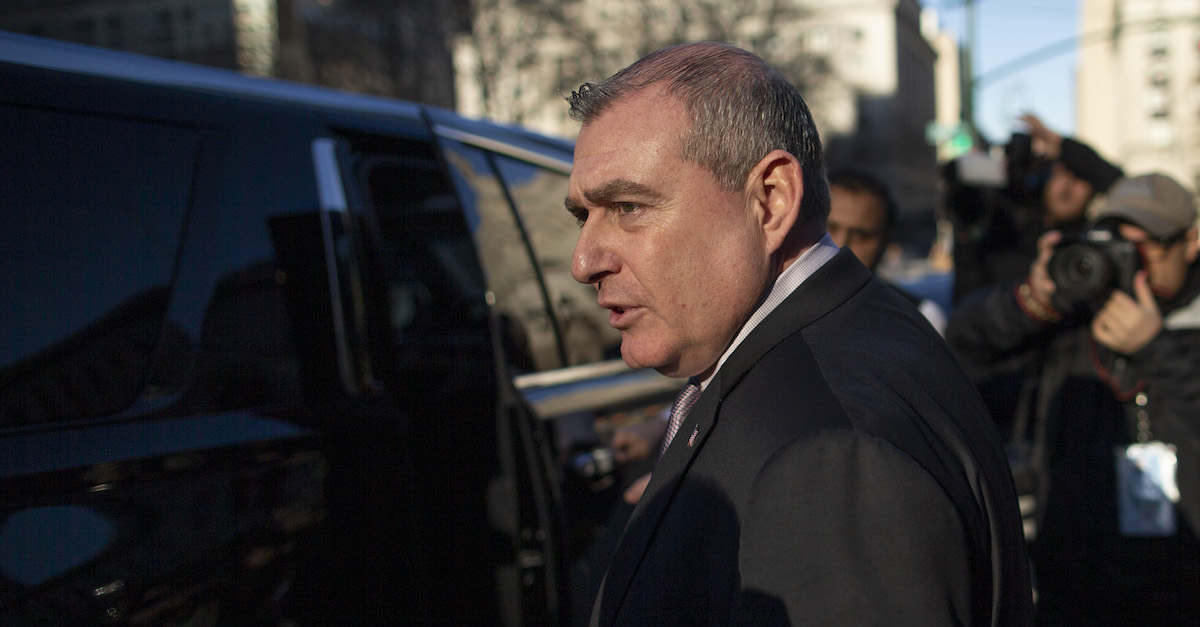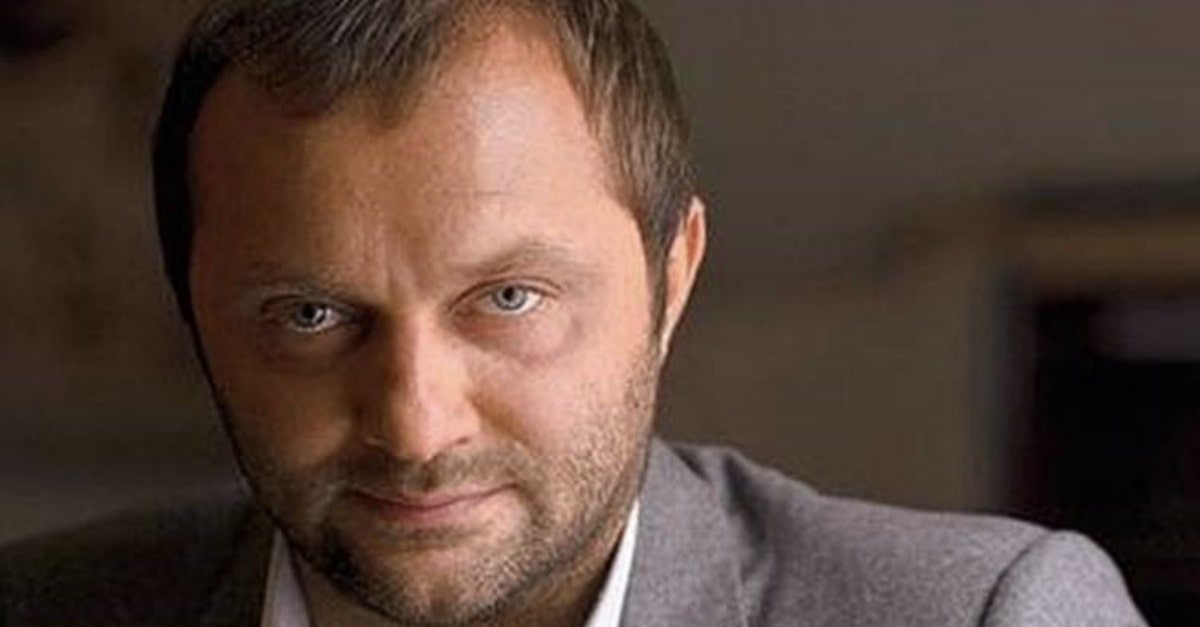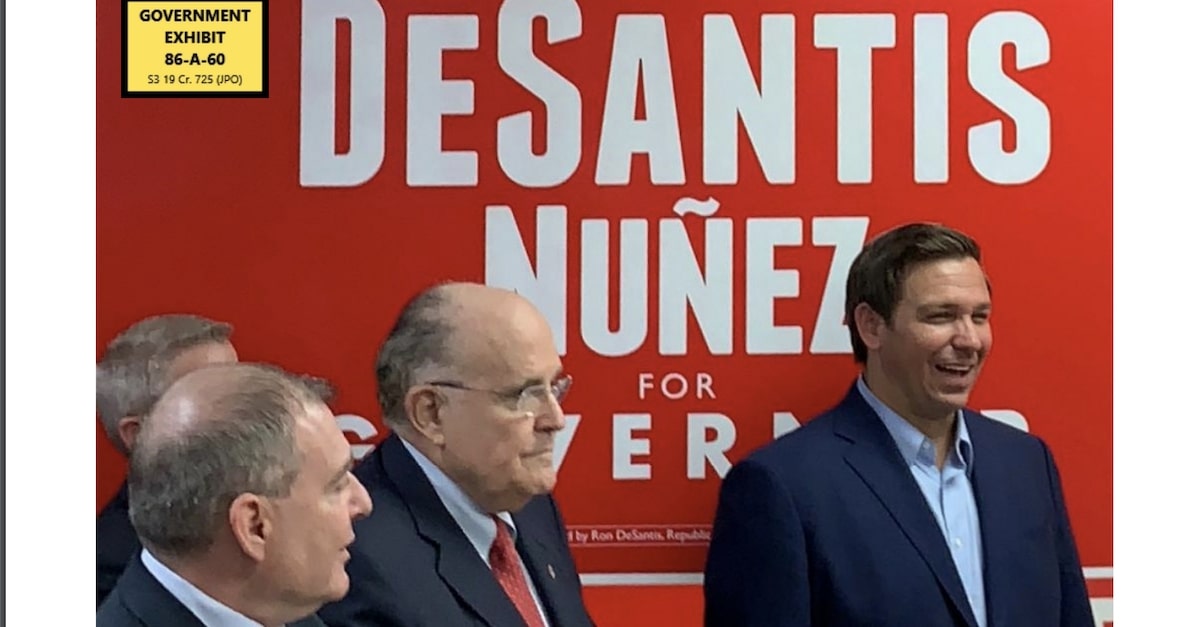
Lev Parnas exits a federal courthouse in Manhattan.
Just a week after opening a long anticipated trial in Manhattan, federal prosecutors told jurors to convict former Rudy Giuliani associate Lev Parnas and his accused co-conspirator Andrey Kukushkin of illegally funneling a Russian tycoon’s money into U.S. elections.
“This is exactly what straw donations look like,” Assistant U.S. Attorney Hagan Cordell Scotten declared on Thursday morning, leading jurors through evidence submitted at trial.
The brisk trial set aside the legacy of Ukraine-related impeachment drama that preceded it. Prosecutor focused their case on $1 million from Russian tycoon Andrey Muraviev allegedly funneled by Parnas and Kukushian, roughly $150,000 of which the government says illicitly made its way into U.S. elections. Prosecutors claimed that the payments were designed to help the donors obtain licenses for their marijuana businesses. Muraviev, who has not been charged with wrongdoing, had a picture of someone “mooning the Statue of Liberty” as his WhatsApp avatar, the prosecutor said.

Photo of Andrey Muraviev introduced during the trial of Lev Parnas. (Source: DOJ)
“Make no mistake: The purpose behind this conspiracy was influence-buying” Scotten told jurors.
Over the course of a week, a jury heard from some of the recipients of Parnas and Kukushkin’s largesse, including ex-Nevada Attorney General Adam Laxalt and the pro-Trump super PAC America First Action’s then-finance director Joseph Ahearn. Parnas’s company Global Energy Producers donated $325,000 to America First Action, and Parnas personally donated $11,000 to Protect the House, a joint fundraising committee to various GOP causes associated with then-House Majority Leader Kevin McCarthy (R-Calif.).
Two of the witnesses testified under court-granted immunity: Ahearn and Parnas’s former personal assistant Deanna Van Rensburg.
Throughout the defense case, Parnas’s attorney Joseph Bondy argued that his client did not understand the campaign finance restrictions that he allegedly violated. Bondy repeatedly contrasted the education and legal training of the witnesses with that of his client, who only obtained his GED. He continued to hammer that point during closing arguments.
“We’ve done our best to do what we thought was important to bring you the defense,” Bondy told jurors.
Trying to undermine claims about his client’s alleged motive, Bondy noted that some of the recipients of Parnas’s donations—like conservative then-Republican AG Laxalt—were ideologically opposed to cannabis. Bondy, a prominent cannabis attorney who serves as a director for the National Organization for the Reform of Marijuana Laws, suggested that Parnas would have financially supported other candidates more sympathetic to legalization if he wanted to facilitate licenses for his business.
“The notion that there’s a conspiracy to give one million dollars to people who look at marijuana as the devil’s lettuce … would be foolish,” Bondy said. “It just doesn’t operate that way.”
Bondy had particularly sharp words for Laxalt, who Bondy said was only kind to Parnas because he wanted money. In reality, Bondy said, Laxalt thought Parnas was “clownish,” and looked down on him, perhaps because Parnas wore a gold chain, and had a Brooklyn accent, or maybe because he wanted to be close to power.
“Each of us knows in a distinct way what it’s like to be scorned for being different, how hurtful that is,” Bondy said. “How much more it hurts when someone smiles to your face and laughs at you behind your back, makes jokes, snickers.”
“It’s disgusting,” Bondy added. “Don’t be that person.”
Bondy also went after the credibility of Van Rensburg, who he said was evasive and inconsistent on the stand.
On direct examination from prosecutors, Bondy said, Van Rensburg remembered extensive details of what she did under Parnas’s direction, but didn’t recall nearly as much when he cross-examined her.
“The truth doesn’t change,” Bondy said of Van Rensburg. “It just gets selectively remembered sometimes.”
Kukushkin’s lawyer Gerald Lefcourt previously depicted his client as a dupe of Parnas and Correia.
“They saw Mr. Kukushkin as a rube, inexperienced,” Lefcourt said during opening statements, adding that they saw his client as a way to get to Muraviev.
Shortly after his initial indictment some two years ago, Parnas launched into an extraordinarily public counteroffensive for a criminal defendant. The initial charges in the early stages of the events that led to former President Donald Trump’s first impeachment, and Parnas decided early on to cooperate with the House committees investigating him. Parnas shared thousands of emails, text messages, photos and videos with investigators, who released a significant portion of those files with the public. Those images showed Parnas pictured with top Republicans like Trump, Rep. McCarthy, Florida Gov. Ron DeSantis (R), and then-Vice President Mike Pence, who was also associated with Protect the House.

This photo of Lev Parnas, Rudy Giuliani and Florida Gov. Ron DeSantis (R) was entered into evidence during trial. Giuliani is reportedly under investigation. Neither Giuliani nor DeSantis have been accused of wrongdoing. (Photo via DOJ)
Though House Democrats declined his offer to testify, Parnas agreed to sit down for multiple interviews with major news outlets, starting with MSNBC host Rachel Maddow and then CNN’s Anderson Cooper. Those interviews focused on the then-active impeachment investigation and the efforts by Trump surrogates to manufacture dirt on then-candidate Joe Biden through a coterie of Ukrainian operatives like Yuriy Lutsenko. Parnas also spilled the Trump administration’s secrets about machinations in other countries like Venezuela to Turkey.
Such globe-hopping tales of intrigue ultimately proved far afield of his trial.
Though Parnas’s first indictment first implicated him in the plot to smear and oust former U.S. Ambassador to Ukraine Marie Yovanovitch—whose anti-corruption bona fides reportedly stood in the way of the Trump administration’s misinformation campaign against the Bidens—prosecutors scrubbed those allegations from his superseding indictment. Parnas’s reputed sidekick Igor Fruman copped a non-cooperation plea deal before trial, as did fellow accused co-conspirator David Correia.
Prosecutors continue to investigate Giuliani, a former U.S. Attorney in the same district who continues to try to assert attorney-client privilege in order to shield information seized by the government. That probe reportedly looks into whether Giuliani’s lobbying in Ukraine violated federal law.
During a video released during the trial, Giuliani sits between Parnas and Fruman.
“I’m here with my friends Lev and Igor [Fruman],” Giuliani says in the video, referring to an organization starting in Ukraine, “one of my favorite countries,” the former mayor says.
The jury, which will begin deliberations, did not hear about the scandal of old—or the politically combustible context that continues to surround it.
(Photo by Eduardo Munoz Alvarez/Getty Images)